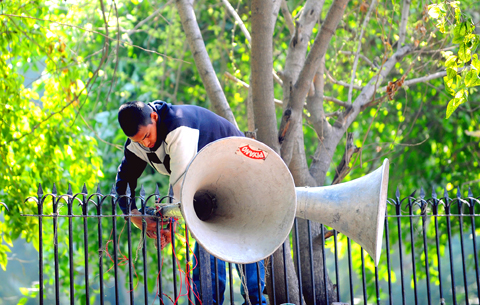By and large, Indians embrace noise. Their festivals are a riot of color and sound, weddings an exercise in high-decibel exuberance and house parties an extreme test of neighborly tolerance.
Now, however, things have reached such a pitch that the government has decided to step in, beefing up decade-old noise pollution regulations to keep the volume dial turned down.
“Stress has been laid on making the night peaceful,” the Environment Ministry said last month as it published a set of guidelines specifying when violations should be considered serious enough to merit police action.

PHOTO: AFP
The guidelines cover a variety of noise sources from construction sites and car horns, to living-room stereos and festive firecrackers.
The noise limit in residential neighborhoods is set at 45 decibels at night and 55 decibels in the day — roughly equivalent, respectively, to the noise produced by soft and loud conversation.
Anyone found to be producing noise in excess of those limits by more than five decibels should face sanction from police.
“These will give enforcing agencies more powers to implement rules as they are clear, precise,” J.S. Kamyotra of the Central Pollution Control Board (CPCB) said.
Privately, some officials admit that enforcing regulations is a much harder task than drafting them.
“Lets face it, we have been trying to stop people from smoking in public places and it hasn’t worked,” a senior control board official said on condition of anonymity. “There are laws, fines and punishments, but people always find a way to work around them and if a policeman tries to shut down loudspeakers at a religious event, he risks being lynched for daring to offend religious sentiments.”
Such skepticism is backed by the fact that no one has ever been convicted under the 2000 Noise Pollution Control Act — which promises seven years’ imprisonment to proven offenders.
With its billion-plus population, multiple religions and extraordinary social diversity, India is an almost limitless source of different, and often very loud, sounds — as any first time visitor to the country can testify.
“We Indians are a noisy lot, be it loud weddings or honking on the streets,” Delhi’s chief minister Sheila Dikshit said during a recent conference on environmental health risks.
“Silence talks to us. We do not realize this because of the amount of noise that surrounds us and noise pollution is a major problem,” Dikshit said.
Displays of wealth, power, happiness and religious faith take place, more often than not, with a high-decibel accompaniment.
“I had a rich neighbor who celebrated his son’s wedding in a park in front of my house. The music was simply deafening,” said an Indian government official, who did not want to be named. “When I asked him to turn it down as it was close to midnight, he refused, saying his son would get married only once and he didn’t want to mar the celebrations.”
During celebrations last year for Diwali, the Hindu festival of lights, the CPCB registered noise levels in some New Delhi residential areas as high as 85 decibels, which can result in permanent hearing loss after sustained exposure. Background traffic noise in Delhi can average between 85 and 100 decibels during the day.
Dipankar Gupta, a former sociology professor at Jawaharlal Nehru University in Delhi, said the growth of private incomes in India had only added to the din.
“In India, as in many developing countries, people think making a noise is their prerogative,” Gupta said. “With rising affluence, India has become more and more noisy because noise is unfortunately associated with status and power. The children of the rich and powerful think its fashionable to make the most noise.”
Environmental activists say politicians often set an appalling example, hosting or attending rallies where loudspeaker volumes are ramped up to maximum.
“Politicians assume they are exempt from the law and the police often don’t take action against them,” said Sumaira Abdulali, head of the voluntary group Awaaz (Noise) based in Mumbai. “It is only through citizens’ vigilance that we have seen a decrease in noise levels from political functions in Mumbai, but this is an uphill struggle when the law breakers are those who are supposed to be enforcing the law.”

With much pomp and circumstance, Cairo is today to inaugurate the long-awaited Grand Egyptian Museum (GEM), widely presented as the crowning jewel on authorities’ efforts to overhaul the country’s vital tourism industry. With a panoramic view of the Giza pyramids plateau, the museum houses thousands of artifacts spanning more than 5,000 years of Egyptian antiquity at a whopping cost of more than US$1 billion. More than two decades in the making, the ultra-modern museum anticipates 5 million visitors annually, with never-before-seen relics on display. In the run-up to the grand opening, Egyptian media and official statements have hailed the “historic moment,” describing the

SECRETIVE SECT: Tetsuya Yamagami was said to have held a grudge against the Unification Church for bankrupting his family after his mother donated about ¥100m The gunman accused of killing former Japanese prime minister Shinzo Abe yesterday pleaded guilty, three years after the assassination in broad daylight shocked the world. The slaying forced a reckoning in a nation with little experience of gun violence, and ignited scrutiny of alleged ties between prominent conservative lawmakers and a secretive sect, the Unification Church. “Everything is true,” Tetsuya Yamagami said at a court in the western city of Nara, admitting to murdering the nation’s longest-serving leader in July 2022. The 45-year-old was led into the room by four security officials. When the judge asked him to state his name, Yamagami, who

‘CHILD PORNOGRAPHY’: The doll on Shein’s Web site measure about 80cm in height, and it was holding a teddy bear in a photo published by a daily newspaper France’s anti-fraud unit on Saturday said it had reported Asian e-commerce giant Shein (希音) for selling what it described as “sex dolls with a childlike appearance.” The French Directorate General for Competition, Consumer Affairs and Fraud Control (DGCCRF) said in a statement that the “description and categorization” of the items on Shein’s Web site “make it difficult to doubt the child pornography nature of the content.” Shortly after the statement, Shein announced that the dolls in question had been withdrawn from its platform and that it had launched an internal inquiry. On its Web site, Le Parisien daily published a

DEADLY PREDATORS: In New South Wales, smart drumlines — anchored buoys with baited hooks — send an alert when a shark bites, allowing the sharks to be tagged High above Sydney’s beaches, drones seek one of the world’s deadliest predators, scanning for the flick of a tail, the swish of a fin or a shadow slipping through the swell. Australia’s oceans are teeming with sharks, with great whites topping the list of species that might fatally chomp a human. Undeterred, Australians flock to the sea in huge numbers — with a survey last year showing that nearly two-thirds of the population made a total of 650 million coastal visits in a single year. Many beach lovers accept the risks. When a shark killed surfer Mercury Psillakis off a northern Sydney beach last